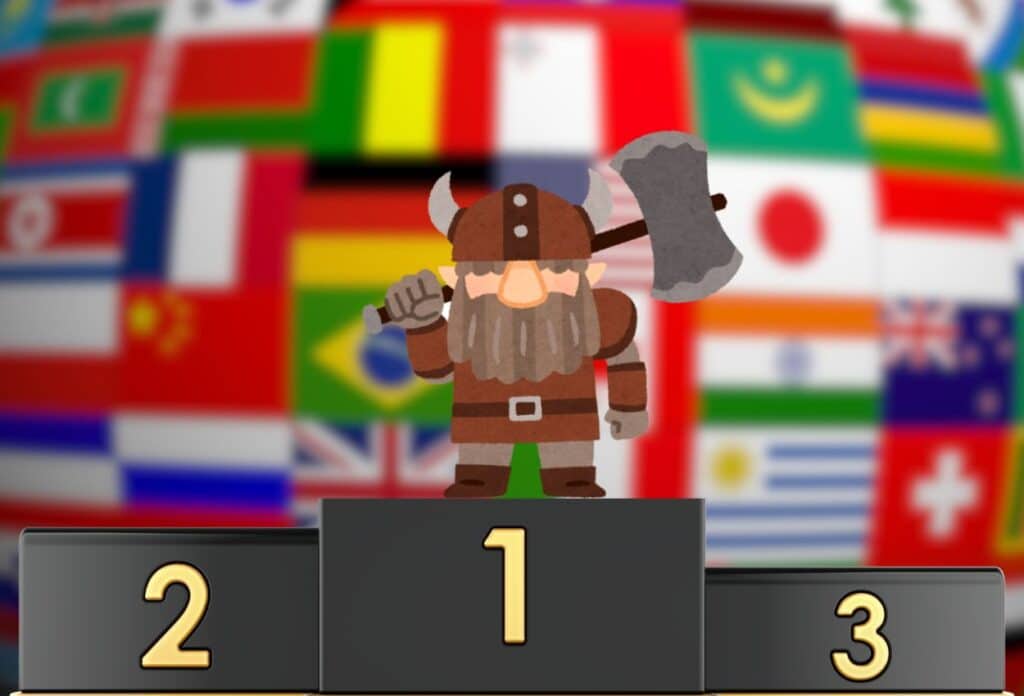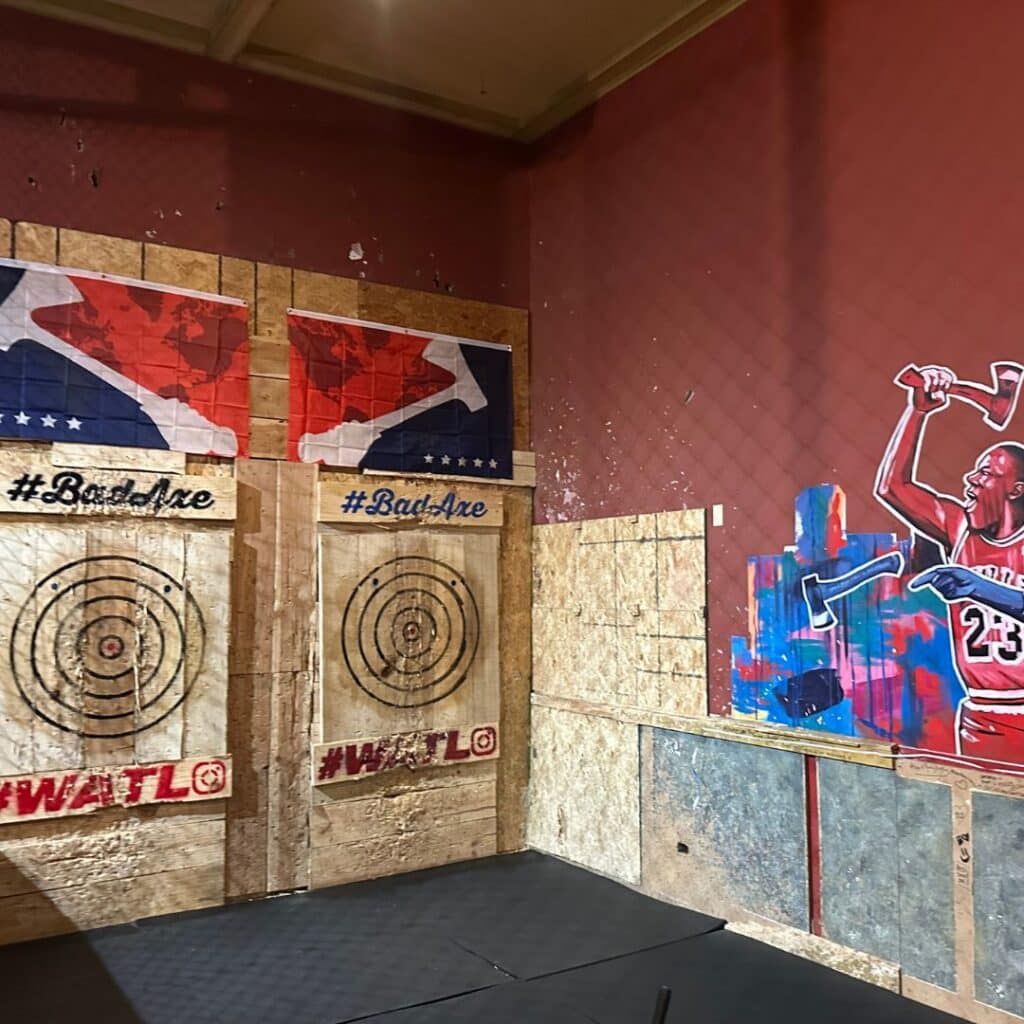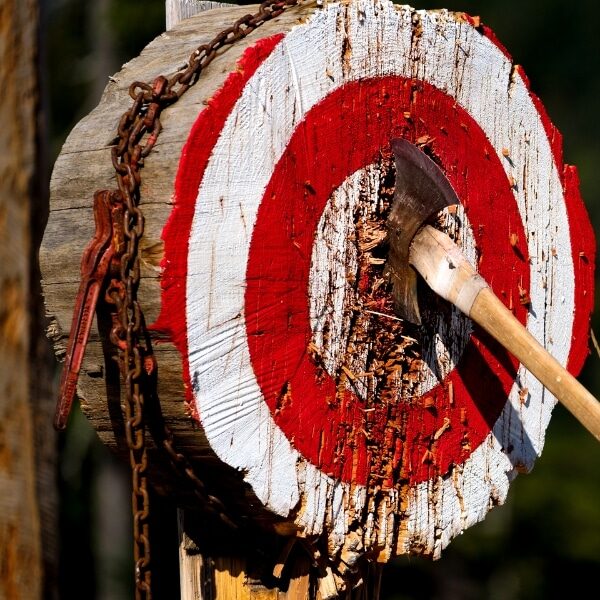Here Are 5 International Competitions To Test Your Axe Throwing Skill Against The World’s Best
A list of 5 international competitions to consider if you want to try out your axe throwing skills against the best in the world

There are a plethora of local, national and international competitions occurring all year round in various axe throwing disciplines. Listing every competition worldwide would be a hard task, and in any case, would soon be out of date. However, if you really want to test your axe throwing skills against the best in the world, here is a list of five regular international competitions to consider.
AIM Games
AIM Games run online tournaments for both knife and axe throwing. To compete, you video your hits on their bespoke tournament target and submit it to their panel for verification of your score. Each tournament lasts for 80 days and you can submit improvements throughout the period.
The tournaments are free to enter (other than paying to throw at a range of course). Generous cash prizes are awarded for up to 200th position (over $100,000 worth of prizes annually.)
AIM Games was started in 2005. It was founded as non-profit organisation with the aim of encouraging inclusive participation in knife and axe throwing worldwide. In particular, the lack of an entry fee reducing the financial barrier. To date, the tournaments have included participants from 28 different countries.
Each tournament has a unique game that comes with a creative story and equally creative graphics. The details for the bespoke target are provided for throwers/venues to paint on their boards. As every tournament has a new game with new rules, throwers need to navigate the Aim Games website and various tutorials to understand the game (which can take a bit of effort to get your head around).
It attracts folks from the outdoor range/club scene, but the easy accessibility of being online has also attracted throwers more used to IATF and WATL indoor hatchet throwing too. There are about three tournaments per year, alternating between axe and knife throwing.
Aim Games Key Points
| How to enter | Register at aimgames.com |
| Cost (for participant) | Free |
| Eligibility | Open to all |
| Positives | Free/Easy to submit a video entry any time you like Worldwide participation, including from countries who might find it difficult to attend physical events, eg Ukraine Generous cash prizes Unique/challenging games |
| Negatives | Some throwers may miss the camaraderie of a physical tournament Tournament details may be hard to understand initially |
International Axe Throwing Championship
The International Axe Throwing Championship is hosted annually by the International Axe Throwing Federation (IATF), in Toronto, Canada. Participants earn a place at the championship through competing in a variety of IATF tournaments/leagues throughout they year and compete to win the Wilson Cup for the best IATF hatchet thrower.
The IATF was founded in 2016, by the BATL axe throwing organisation as a way to standardise axe throwing rules and encourage competition. There are currently around 150 affiliated venues in 6 countries (Australia, Canada, Estonia, Poland, UK, USA).

BATL/IATF have been very focused on competition from the beginning, and affiliated venues organise local leagues and tournament with a view to enabling throwers to compete at the IATC.
Participants register each March and record their progress/wins in local leagues throughout the year. They can also qualify by winning Major and Grand Slam tournaments, or one of the 9 Regional Championships. The aim is to become a qualifier for Round 1 of the Wilson Cup. The Round 1 qualifiers are held the following March in affiliated locations worldwide. Then, the top 256 competitors will go on to Round 2 at the IATC in Toronto in the summer.
In addition to the prestige of winning, there is a prize pool for the top 32 players (currently CAD $33,800). Alongside the Wilson Cup, there are other subsidiary competitions at IATC, such as Big Axe, Close But No Cigar and Under 60 (scoring average). There are cash prizes for these competitions too.
IATF Key Points
| How to enter | Find a local IATF venue to join here |
| Cost (for participant) | 225 CAD to register for Wilson Cup (+ additional costs to enter leagues/tournaments) |
| Eligibility | IATF members |
| Positives | Highly competitive – qualifiers need to earn their place at the competition (from 20,000+ IATF members) International competition Generous cash prizes Standardised rules at all levels/locations |
| Negatives | Requires regular commitment in time and money Only in 6 countries currently (and mostly USA, Canada and Australia) |
UKAT World Championship
The United Axe and Throwers (UKAT) have been hosting a knife and axe throwing world championship since 2021. The championship provides the opportunity to compete in multiple disciplines in both axe and knife throwing over a three day period.
UKAT was created in 2018, but has become more prominent in the “club based” knife and axe throwing scene since 2021. It aims to unify the knife and axe throwing community through common and shared regulations. It has created a UKAT set of rules, which are used at the world championship, and also at other UKAT endorsed competitions in different countries.
There are variety of disciplines to compete in (24 at the 2025 event). These include such things as walk-back where the axe/knife is thrown from 3, 4, 5, 6 and 7m in succession. These disciplines are more common in outdoor club throwing and would be a challenge to hatchet throwers used to single distance throwing.
Compared to some of the other international championships, this is a relatively small event. The 2025 event has a max competitor limit of 150. However, it does attract throwers from across the world, particularly from Europe, and is hosted in different countries to encourage that. The 2025 World Championship is in Czechia. Past championships were in UK, France, and Italy.
UKAT Key Points
| How to enter | Register at: competitionscores.bladethrowers.cz for 2025 See UKAT Facebook page for future events |
| Cost (for participant) | 90 Euro (for 2025) |
| Eligibility | Open to all |
| Positives | Variety of throwing disciplines Easy to register/open to all Standardised rules used in other competitions too Hosted by local clubs |
| Negatives | Not a large competitor field (albeit highly skilled competitors with years of experience ) |
World Axe and Knife Throwing Championship
The World Axe Throwing League (WATL) has run an annual world axe throwing championship since 2018. In 2021, they set up the World Knife Throwing League (WKTL), and now, together, they host the concurrent World Axe and Knife Throwing Championship each year at locations around the USA.
WATL was founded in 2017 in an attempt to standardise and promote axe throwing. It currently has over 330 affiliated clubs in 13 countries (although predominantly in North America). The clubs use the standardised WATL axe, and knife, throwing rules in local venues and leagues, as well as in the big tournaments.

In order to earn a place at the WAKTC championship, throwers need to earn bids by competing in WATL-sanctioned leagues or tournaments held at affiliated venues throughout the year. There are also some discretionary bids aimed at encouraging throwers from under-represented areas.
There are three axe throwing disciplines at the WAKTC: hatchet, big axe (single bit felling axe) and duals (a team of two throwing hatchets at the same target simultaneously). 256 throwers go forward to WAKTC for the hatchet competition and a minimum 128 in each of the duals and big axe disciplines. The prize pool for 2025 was $65,000 split across the 3 disciplines + 2 knife disciplines.
WATL Key Points
| How to enter | Find a local WATL venue to join here |
| Cost (for participant) | Cost to enter leagues/tournaments in region of $100 each |
| Eligibility | WATL members |
| Positives | Generous cash prizes Standardised rules at all levels/locations Highly competitive – qualifiers need to earn their place at the competition throughout the year Probably the most high profile axe throwing organisation in the world |
| Negatives | Few opportunities to compete outside Canada and USA Requires regular commitment in time and money |
World Double Bit Axe Throwing Championship
The World Double Bit Axe Throwing Championship, as it sounds, is the world championship for double bit (ie using full size double bit/bladed logging axes) axe throwing. It is organised by Global Axe Throwing (GAC) and is hosted by local axe throwing clubs around the world.
GAC was founded in 2019 as a representative body for double bit axe throwing clubs worldwide. It currently has member clubs in Canada, Finland, Germany, Ireland, Sweden, USA and Switzerland. However, it also sanctions double bit axe throwing competitions run by general axe throwing clubs in other countries, eg the 2024 world championship was held in the UK.
The world championship use a standardized target and ruleset, which is also used in other GAC sanctioned events (as well as more broadly by double bit throwing clubs).
Double bit throwing is even more niche than other axe throwing, despite having a longer tradition arising out of the lumberjack sports in the 1980s. However, it has seen some growth in recent years, possibly due to the widespread interest in hatchet throwing, and has a dedicated (and competitive) following in the clubs that pursue it. There were 205 competitors for the 2024 world championship (from 13 different countries).

As well as the individual competition, throwers can also compete for their country in the team competition.
GAC Key Points
| How to enter | Look out for announcements for future world championships on the GAC Facebook page to register |
| Cost (for participant) | £100 (for 2024 inc one guest) |
| Eligibility | Open to all (but requires pre-registration and qualification) |
| Positives | Easy to register/open to all Standardised rules used in other competitions too Hosted by local clubs Take part as member of national team |
| Negatives | Not a large competitor field (albeit highly skilled competitors with years of experience) Competition only happens if a host club can be found and enough people register |






